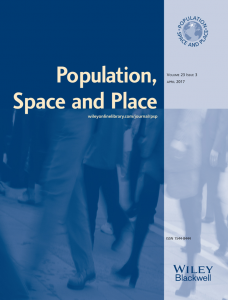The “Meat Paradox”, Culture, and Beyond
by Jessica Poling, Rutgers University, New Jersey · Published · Updated

Cultural sociologists have repeatedly sought a model to explain how culture motivates action. Ann Swidler famously introduced the “cultural toolkit”: an individual’s collection of cultural scripts from which they can draw upon in various contexts. More recently, cultural sociologists have used theories from cognitive science to explain how actions are driven by the interaction between cognition and the individual’s environment. These models emphasize that individuals’ choices are never purely made out of free will; rather, they are a product of their social environment. Furthermore, rather than viewing individuals’ actions as purely rational, this framework illuminates how cultural norms and values shape actions – even if they seem illogical.
Oleschuk, Johnston, and Baumann tackle this issue in their recently published article, “Maintaining Meat: Cultural Repertoires and the Meat Paradox in a Diverse Sociocultural Context”. The authors unpack the juxtaposition between growing concerns over the ethics of meat consumption and the fact that, despite these changing attitudes towards the meat industry, meat consumption has remained high in Europe and North America. In short, how do people justify their meat consumption even if they acknowledge the problems with it?
The authors draw on the concept of “cultural repertoires” to explain this paradox. Cultural repertoires encompass values, habits, and routines that act as tools to help individuals make choices and guide action. Furthermore, individuals select from a variety of scripts in their “cultural toolkit” depending on their context. By using this concept to guide their investigation, the authors are able to go beyond individual or psychological explanations for consumption practices and contextualize the consumer in a particular cultural space. Moreover, by acknowledging the multiplicity of culture and the agency of actors in selecting particular scripts in a given moment, the authors are able to give meaning to the contradiction between individuals’ values about eating meat and their continued consumption.
Using interviews with a diversity of vegetarians and meat-eaters, the authors identify two repertoire categories: identity repertoires and liberty repertoires. The authors define identity repertoires as those which are based in personal, embodied group identities. Participants expressed two types of identity repertoires: meat consumption as a form of embodied masculinity and meat consumption as a cultural practice and expression. Liberty repertoires, on the other hand, are more abstract and rooted in a sense of one’s rights. Respondents conveyed their use of liberty repertoires by expressing “consumer apathy” – in essence, their right to ignore “inconvenient truths” – as well as their individual right to choose their own consumption practices.
Oleschuk, Johnston, and Baumann’s article does more than simply explaining consumption patterns; rather, these conclusions illuminate the relationship between culture and action. By identifying the various cultural scripts individuals use to guide their choice to consume meat, the authors demonstrate the power culture has to guide actions – even if they are seemingly at odds with simultaneously held values.
Oleschuk, Johnston, and Baumann’s conclusions about meat consumption lead us to consider how other contemporary debates are similarly fueled by cultural scripts. In our tense social and political climate, how else are individuals’ actions guided by their cultural values? Moreover, how might these actions also seemingly be at odds with our emerging realities?
We might think about these questions in regard to attitudes towards climate change. Although the term “global warming” has long been in the public consciousness, it is only recently that most Americans seem convinced by scientists’ and environmentalists’ warnings. Even the majority of Republicans, who historically have not strongly supported environmentalist policies, are reported to believe in climate change (compared to only 49% of their party in 2015). With this wave of acceptance, we might expect Americans to be in a hurry to adopt environmentalist practices in their daily lives. To some extent, we have indeed seen a wave of environmentalism; in 2019 Americans suddenly became overwhelmingly concerned with the impact of plastic straws on sea turtles. Consumption of multi-use plastic products has also spiked, with the popularity of products like reusable food wraps, silicone food storage bags, and glass water bottles growing.
These trends show a growing acceptance of climate change and Americans’ willingness to make small changes in their daily lives. Despite this, Americans are resistant to making more dramatic changes in their lives to combat the looming dangers of climate change. A 2018 poll from the Energy Policy Institute at the University of Chicago reported that while 57% of Americans are willing to pay a $1 monthly fee to combat climate change, only 23% were willing to pay $40. Washington voters voted down a modest carbon tax and even Colorado residents rejected a proposal to slow down oil and gas projects. Moreover, despite growing conviction that oil-fueled cars are destroying our environment, Americans continue to value cars both for their convenience and cultural status.
Thus, similar to the “meat paradox” discussed by Oleschuk, Johnston, and Baumann, Americans’ reported values and actions towards climate change present a striking paradox. Although Americans have increasingly acknowledged the reality of climate change, they remain hesitant to make dramatic changes to address it. These parallels might lead us to consider how culture is similarly at work in the case of climate change. It is imaginable that Americans would also deploy identity-driven scripts to justify their lack of participation in environmentally-friendly practices. Energy inefficient cars like the Hummer are typically masculinized; moreover, environmentalism is often feminized due to its implicit caring and nurturing undertones. Environmentalism may also contradict some cultural practices; for example, while “fast fashion” has been increasingly criticized for its wastefulness, it remains a means for everyday Americans to keep up with cultural trends. Oleschuk et al.’s “liberty repertoires” may also be at work in the climate change paradox. Americans might ask – why should it be up to me to fix this global problem? Could my own consumption practices actually make much of a difference? What gives someone the right to tell me how much single-use plastic to buy or what car to drive?
Clearly, the meat paradox is not alone. Cultural repertoires and scripts are widely useful tools when considering widespread juxtapositions between individuals’ values and their actions. The cases of meat consumption and climate change action demonstrate the complexity of culture. Once again, it is clear that culture is not simple or straight-forward; it is uniquely used by individuals and may vary over context or time. À la Swidler (1986), culture is truly a tool – but that does not necessarily mean that it is always rational. Rather, it may lead us to make choices that are seemingly paradoxical, potentially harmful, yet logical and justified under the frame of our cultural context.
Jessica Poling is a Doctoral Student in the Department of Sociology at Rutgers University, New Jersey.
Read the original article by Oleschuk, Johnston and Baumann here.





